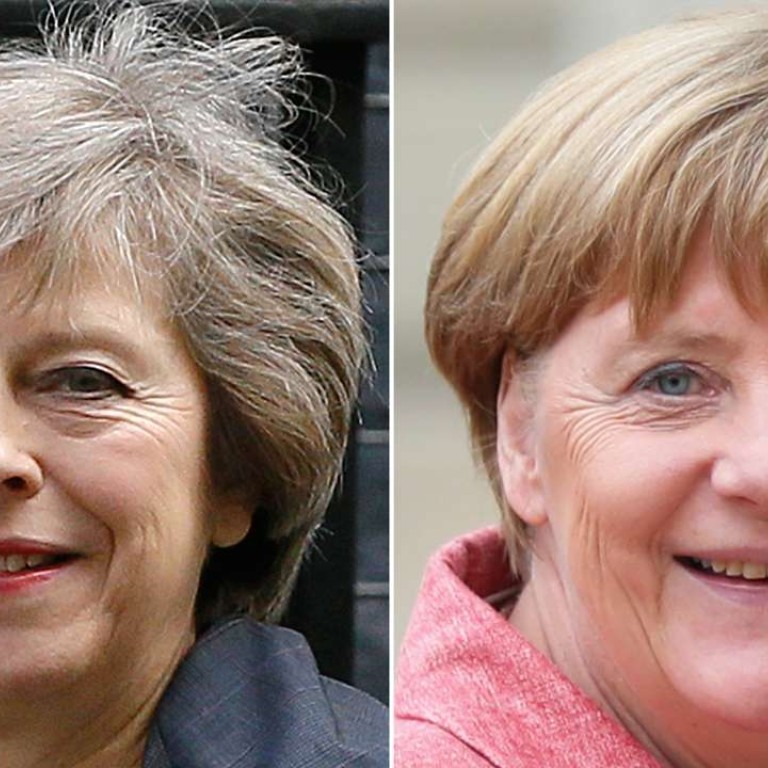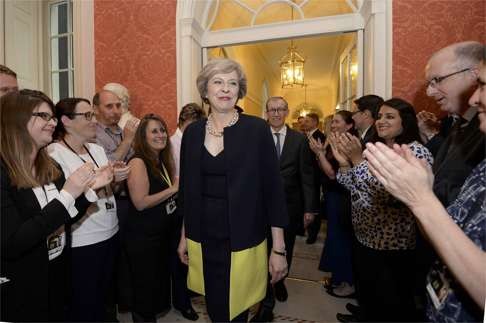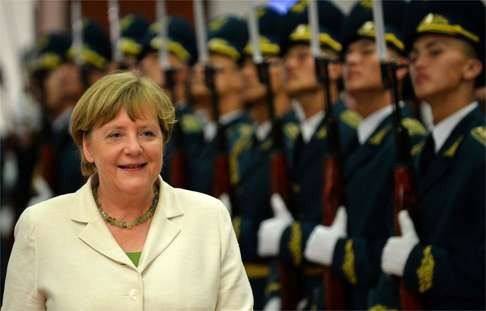
Brexit crisis will test the mettle of ‘Iron Ladies’, Theresa May and Angela Merkel
Pragmatic, childless pastors’ daughters with killer instincts who were long underestimated by their blustering male peers - the parallels between new British Prime Minister Theresa May and Germany’s Angela Merkel are striking at first glance.
But analysts warn that resemblance may mask more fundamental differences that will complicate talks on Britain’s divorce from the EU, pitting its newest leader against its longest-serving.
May took office Wednesday as Britain’s second woman to occupy 10 Downing Street after Margaret Thatcher, the “Iron Lady” with whom both she and Merkel have frequently been compared.
Like May, who was depicted this week in a Times cartoon on a blood-stained carpet surrounded by erstwhile rivals with daggers in their backs, Merkel’s rise also came after years lying in wait until the time was ripe to snatch the crown.

“There’s also a degree of seriousness about May that I think she shares with Merkel, and after the bonfire of the vanities in the Tory party, that now seems particularly appealing.”
The Financial Times as early as 2014 wrote an admiring profile of May entitled “Britain’s Angela Merkel?” which said each was a “non-ideological politician with a ruthless streak who gets on with the job”.
Beyond noting their shared passion for mountain hikes and cooking, it quoted a 2012 interview May gave the Daily Telegraph in which she hailed Merkel’s no-nonsense approach.
“If you think of what [Merkel]’s achieved, you know, there are still people who don’t rate her, are a bit dismissive, perhaps because of the way she looks and dresses. What matters is, what has she actually done?”
Some of Merkel’s opponents in Germany would also argue that May reminds them of the chancellor, and for the incoming prime minister, that may bode well.

Germans still call her “mutti” - a trivialising word for mother - even though Merkel does not have children.
In Britain, May’s childless marriage caused a heated debate after her Conservative Party rival, Andrea Leadsom, said she was a better candidate because she had children. Those comments were roundly criticized, and Leadsom preemptively dropped out of the race on Monday.

Germany’s top-selling daily Bild asked this week “How much Merkel is in Mrs Brexit?” and noted the “surprising” number of similarities between the 61-year-old German leader and May, 59.
“Neither is yielding, let alone submissive, in negotiations - both preachers’ daughters are seen as strong-willed, almost to the point of stubborn.”
However it noted that one crucial point of divergence was their stance on migrants, contrasting Merkel’s “We will manage” mantra during last year’s refugee influx with May’s “uncompromising” calls for stricter controls on new arrivals to Britain.
Bild, which has generally backed Merkel’s liberal policy, said May had flirted with “crude right-wing populism” in touting a hardline immigration policy.
May, who discreetly backed the Remain campaign ahead of last month’s shock EU referendum result, has said immigration controls would have to be included in any deal for Britain to access the EU’s single market.
“The key question is whether they can keep their cake and eat it - in other words, single market access and immigration restrictions,” Stelzenmueller said.
“It would be very, very difficult for Merkel to make that kind of concession. The risk of setting a bad example that then encourages and enables the fragmenting forces in Europe is more than Merkel can responsibly incur.”
Merkel called this week for patience with May as she settles in.
“I look forward to meeting her,” she told SAT.1 television. “[But] there has to be time for the new government to decide ‘what relationship do we want to have with the European Union?’ We can’t define that for them.”

Merkel also spoke by phone with May on Wednesday to congratulate her on the appointment, the chancellor’s spokesman said.
Both agreed that “friendly ties between the two countries should continue, including in the upcoming negotiations on Britain’s departure from the EU”, he added.
Daniela Schwarzer of the German Marshall Fund think tank said Merkel would play a “decisive” role in the upcoming negotiations once Britain has triggered Article 50 to exit the bloc.
“Germany has a strong interest in keeping Britain as close to Europe as possible,” she said, noting that eight per cent of German exports head to the country.
Looking ahead, news weekly Der Spiegel said Merkel had “no illusions: [May’s] pragmatism won’t make the negotiations any easier”, while Bild ran the headline “They must save whatever can be saved”.
“In the end, the Brexit duo May and Merkel will be sitting across the table from each other during an EU summit night in Brussels, for a final that hopefully will have no losers.”
Additional reporting by Washington Post

.png?itok=arIb17P0)